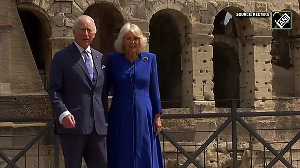Pakistani army will hand over security responsibilities in the insurgency-hit Balochistan province to paramilitary forces within two months after battalion deployed in the restive Sui town returns to the barracks, its chief Gen Ashfaq Parvez Kayani has said.
In an apparent effort to improve the situation in Balochistan and pacify Baloch nationalists, Kayani said the army had dropped plans to set up four new cantonments and was set to induct another 5,000 Baloch youths by relaxing its laws and standards for recruitment.
The powerful army chief, who made the remarks while addressing gatherings at Sui and Gwadar on Monday, said
security responsibilities in Sui town will be handed over to the Frontier Corps in two months. Once the battalion posted in Sui returns to the Quetta cantonment, there would not be any army presence in the province outside cantonments, he said.
"In future, no (military) operation will be conducted in the province without the permission of the provincial government," Kayani said at the inauguration of the Government Institute of Technology in the port city of Gwadar. He said that "not even a single army unit was conducting any operation in the province".
Kayani said 4,000 Baloch youths had already joined the army after completing their training and another 5,000 will be recruited this year after the national census, currently under way in parts of the country, is completed. He announced that no new cantonment will be established in Balochistan against the wishes of the people and that the army had dropped the idea of building four cantonments "because people don't want these".
The proposed Sui cantonment had been converted to a military college, he said. Such decisions were aimed at making people believe that the army, a national institution, respected their opinion, he said. Kayani also spoke of the need for civilian law enforcement agencies to get their act together, indicating that the military was increasingly becoming distraught over their performance.
Internal security was not the military's job alone and others stakeholders needed to play their part, he indicated.
His announcement about returning troops to the barracks appeared to be aimed at pacifying Baloch nationalist rebels, who have been demanding an end to military operations and greater autonomy and control over the abundant natural resources of the province, including gas and minerals.
The nationalists have accused the army, security forces and intelligence agencies of being involved in human rights abuses, including the detention without charge of scores of people. During his visit, Kayani inaugurated an Institute of Technology established by the Army at Gwadar and promised to establish the Balochistan Institute of Mineralogy at Quetta.
He also visited the Military College in Sui and attended the opening ceremony of its first class. The purpose of establishing such institutes is to create a workforce that can exploit local resources, he said.
Kayani also warned against a possible economic meltdown during his speeches. He used the example of the disintegration of the USSR because of economic collapse to drive home the point that a country could not remain stable with a floundering economy even if it had a strong army.
He said it was crucial for steps to be taken to set Pakistan's economic condition in order.







 © 2025
© 2025